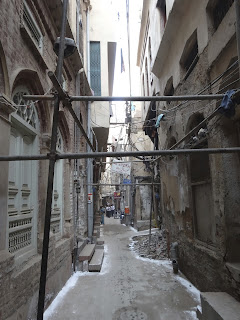The Pakistani Taliban TTP (Tarek-e-Taliban Pakistan) have a new leader, Mullah Fazlullah. He was the commander in Swat during their terror regime from 2007 to 2009 and had the nickname "Mullah Radio" as his hate speeches were constantly flowing on air at the time. On his account goes the recent killing of Major General Sanaullah, the army commander in Malakand/Swat. Still in Afghanistan at the moment, he will have to live up to Hakimullah's charisma to be able to keep together the fragile network of TTP affiliated organizations. A decentralization would further split them on the question of talks with the government, but hardly limit the threats of terror attacks to be expected in their competition to gain authority among the groups.
The days of Muharram have begun - Ashura, remembering and mourning the martyrdom of Hussein, one of Prophet Muhammad's grandsons, who was killed in Karbala (today Iraq) - bring impressive processions of Shia Muslims, mostly dressed in black attire, beating on the chest and the back, some even scratching their head with sharp blades until blood runs down their faces.
The security forces in Pakistan are on high alert during these days, many roads are closed all over the country, all mobile services are shut down and no one is allowed to witness processions from rooftops. Massive search operations lead to the discovery and seizure of arsenals of arms and ammunition that were to be used against Muharram processions, several planned attacks throughout the country could be prevented thanks to these efforts.
Nevertheless, in Rawalpindi, a city of three million inhabitants, violence costs nine lives and dozens of injured, prompting the army to step in and take over the responsibility for the security. The city is now under curfew.
What means roaming the streets chanting for some, even if not quite happily, means home confinement for others, such as us diplomats, as all plans and invitations are simply wiped out by the security team! As there is no way of observing what is going on outside, but through the medias who report thousands of mourners gathering at their annual route in Islamabad, my thoughts wander with the Shias to Karbala twenty three years back, when I was pushing my baby daughter Carla in a stroller on the rough square in front of the golden plated and turquoise tiled mosque. Ardent sun heated the air into shimmering layers as some boys played with buckets full of water, women passed by wrapped in their black Abayas and the men in their colorful suits and hats from different islamic cultures. It was our last excursion as a young family in Baghdad, where we were posted at the time, before we left for the much longed for summer break - a break from the relentless heat, that turned out to be a break without end, a vacation without return…
Only a few weeks later, the ongoing agony of the people of Iraq began, with two Gulf wars following the Kuwait crisis - and after twenty three years still no end to the sufferings in sight, but the interest of the world and the main protagonists during that period has vanished.Luckily in the last days before Muharram brave friends from Switzerland overcome all worrying and well meaning discouragements from family and friends, board the plane and head for a visit - though with no travel guide in their luggage, as there was not a single one in German about Pakistan to be found, but the one "Kultur Schock Pakistan".
We visit Taxila, an ancient and important Gandhara place near Islamabad, where a group of young Pakistanis play Cricket, completely unimpressed on top of a precious excavation site dating back three thousand years - still waiting to be dug.
Nearby a few men hammer relentlessly mortars out of the local grey stone - being sold to grind spices and grains. We consider them a little too bulky to offer them as souvenirs to our guests, weight of luggage is sadly limited these days by the airlines...
The journey with our friends continues to Rawalpindi - "Pindi Windi" and twin city of Islamabad, the older twin - and the plan is a walk through the old bazar. Plans have their own dynamics here and the casual stroll turns unexpectedly into a sprint through the stalls in company of Sheikh Rashid Ahmed with well armed guards around us. We are his guests and that will remain no secret, as it will be aired on television and print media, a surprise at least to us visiting guests! The ladies are not given the chance to spend a single rupee though, as on the first stop a vendor slips on our arms numerous glass bangles in a few seconds and with full force, as our arms unfortunately lack the fineness of Asian wrists and generously offered as a gift.
As we ask about the gold jewelry shops, we are allowed to enter one for approximately five seconds, leaving the vendor perplex and not knowing if that was a clever manouvre to save our lives from an unseen danger or the content of our husbands' purses.
On our hurried "walk" the Sheikh guides us through old alleys to his properties - some of them left and abandoned by Hindu families leaving for India during partition in 1947 - and arrive at one of the buildings that he has donated to a women's college. As over time whole trees have been happily growing out of the cracks of the old ruin, one wonders, if sleeping beauty will ever awake to new life.
The heat has definitely eased up giving way to this wonderfully bright light and crisp air - time for the upholsterers to refresh the cotton fillings of the warm winter mattresses!

















